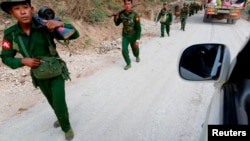There is increasing concern over fighting in Myanmar’s Shan state, where on Tuesday a Red Cross convoy carrying civilians to safety came under fire. Myanmar’s President Thein Sein soon after declared a state of emergency in the region, imposing martial law. An estimated 50,000 people are said to have fled violence, many crossing the border into neighboring China.
The convoy of Red Cross trucks carrying over 100 displaced people away from a conflict zone to safety was attacked despite prominently displaying the Red Cross flag.
Dr. Thar Hla Shwe, the Myanmar Red Cross Society's president, said it is still unclear who exactly was responsible for the attack. He said there were no Myanmar military operations in the area at the time.
“Two of our volunteers got injured one in the head and one in the abdomen and both of them have been looked after in the township hospital and the condition they say is stable but we really regret having our volunteers coming under fire because we are simply carrying out humanitarian work because they have on the vests, the red cross vests, I think they should have been protected," said Dr. Shwe.
The ministry of information of Myanmar, also known as Burma, has blamed insurgents for the shooting, and presidential spokesperson Ye Htut has asked Beijing to reign in any local officials who may be helping the rebels.
The offensive began February 9, when an alliance of armed groups, including the Myanmar Nationalities Democratic Alliance Army (MNDAA), attacked multiple Myanmar military positions in an effort to regain land lost in a 2009 conflict. The MNDAA is the ethnic Kokang army under Peng Jiasheng, who ruled the Kokang self-administered region until the ceasefire signed in 1989 broke down. He is believed to have been living in exile in China for the past five years.
The Kokang group have said they hope to return to autonomous rule, and are unhappy about the imposition of martial law.
Myanmar government mouthpiece The Global New Light of Myanmar reported Tuesday that President Thein Sein vowed not to “lose an inch of land,” and to protect sovereignty. Troops are still occupying Laukkai, the former capital of the self-administered region. Allied rebel fighters have reported airstrikes launched by Myanmar troops from helicopters.
More than 50 Myanmar military troops and 26 Kokang fighters have been reported killed.
This week China called for all sides involved in the conflict to exercise restraint and authorities said they are helping civilians who have fled the violence across the border.
Anthony Davis, a military analyst in the region, said the incident has been disastrous for China-Myanmar bilateral relations, partially because the Kokang are seen as ethnically Chinese.
“China is interested in border stability, you've got thousands of Han Chinese Kokang refugees pouring into China, the Chinese are angry. The Burmese are implying that the Chinese are involved in what, at least one senior Burmese official has referred to on social media, as a Chinese invasion. So the Chinese are angry with that, so Burma is angry with China, and China is angry with Burma. So you can say that the impact of the Kokang offensive has been, at least in the short term, has been disastrous,” said Davis.
Davis said a deadly November 19 attack on the Kachin Independence Army's military academy was a catalyst for the current conflict, unleashing a range of allied groups who trained there. He said the scope of the skirmishes has overstretched the Myanmar army and exposed shortcomings in both intelligence and tactics.










